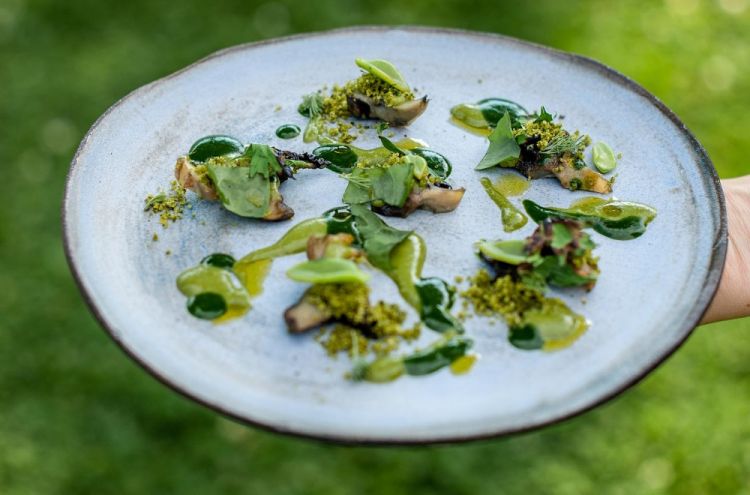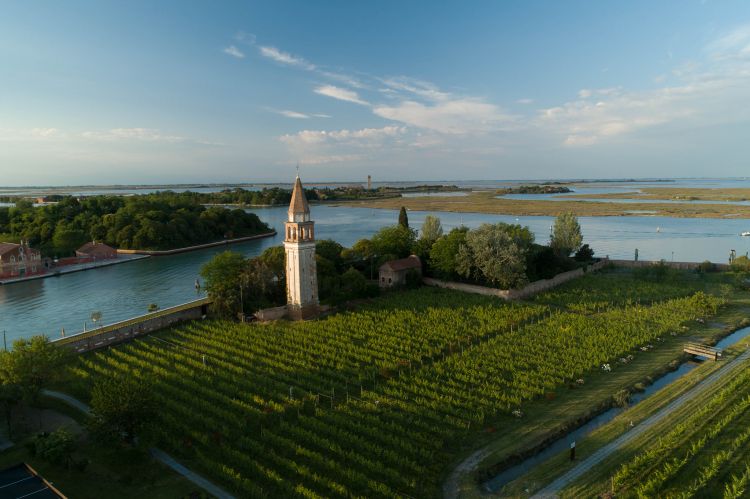A laboratory in continuous evolution. Study and research on fermentations, fish maturation, valorisation of local raw materials. Minimising plastic and food waste, natural wines from around the world, reflections and actions on the quality of life of the staff and the goal of total equality. To illustrate the philosophy of Venissa, the restaurant (with gourmet restaurant and osteria) led by the two chefs Chiara Pavan and Francesco Brutto, one must go beyond the list of dishes, the explanation of the menu.
This is why, as we continue to welcome different ideas and thoughts on the current and future prospects of fine dining on these pages, talking to Pavan and Brutto means asking them some very topical questions. And talking, for example, about the compatibility between the economic sustainability of a catering company and the sustainability practices, both environmental and human, implemented by the company itself.
Chiara, Francesco, let's start with a straightforward question: do you think it is true that what some call 'fine dining' is dying?
FB: Let's hope not! If it were true we would be about to go broke....
CP: The simple answer might be 'no', but the question is complex. Because there are so many factors to consider: certainly today there is a larger fine dining supply than a few years ago, so there is more competition, while various contingencies influence demand. We are not going through an easy time financially, tourism has a fluctuating trend, less constant than a few years ago: for these reasons we have struggled a bit more. In addition, certain cultural and taste trends have also changed: there is a greater demand for rounded, cosy, satisfying flavours. In some ways simpler. But these are trends that even auteur cuisine can interpret very well, they are not threats to its survival.
But can we say that compared to five years ago, achieving economic balance for a fine dining restaurant is more complex?
FB: Again, there are many factors at play. Where the restaurant is located, for example. Issues such as the cost of raw materials, energy, personnel, are very complex. But it is also important, today, to reverse the point of view: our goal is to make the people who work with us feel good, to treat the environment in which we live and work well, to think about environmental protection in a general sense. We must ask ourselves how we can make an approach like this profitable.
CP: Today we finally have to consider environmental and human sustainability. In the meantime, the world around us, and the fine dining market, have not changed much, so we have to try to reach a balance taking these two new factors into account. For us, environmental sustainability means, for example, working on a zero-kilometre basis, excluding all large distributors of raw materials from our suppliers, working with waste products: this lowers the food cost, but increases the working hours needed to process the ingredients. Then there is employee welfare: that is why our restaurant closes two days a week to give the kitchen team the right amount of rest. The dining room team have eight-hour shifts, so more people are needed: this means raising staff costs. If you want to be sustainable, both towards the environment and towards the people who work with you, it is more complicated. Having said that, in a more general sense the fate of a restaurant depends on many elements: let's go back to the economy, to tourism, to where you are. The health of the restaurant business is closely linked to the health of the society and community in which a restaurant is located.

Rapana & lagoon curry, one of the dishes on Venissa's 2023 menu (on which you will soon read a long story by Gabriele Zanatta on this website). As we read on the restaurant's social media, 'the Rapana Venosa is a gastropod that has become invasive in the lagoon and the Upper Adriatic. To this species as to other invasive species Chiara Pavan and Francesco Brutto are dedicating their research, declining them in surprising dishes that, at the same time, contribute to preserving the integrity of the environment'.
CP: Yes, there is an evolution in this sense, but it cannot be quick, it will take time for the results to be concrete. If we want to play an active, critical role in relation to what is happening today, particularly the climate crisis, this is the only possible approach. Our guests feel this, we work hard at communicating what we do, but it will take time. We also function well because we are a composite entity: we attract those interested in wine, those who want to sleep in our rooms, those who dine at the osteria, and those who dine at the gourmet restaurant. But it is the latter that is the most consistent driver. It is fine dining that drives us, but not only that: it is definitely easier for us to be sustainable with the gourmet restaurant than with the osteria.
Interesting: can you explain why?
CP: As I said before, the food cost is significantly lower. It is true that to process certain ingredients that are considered waste requires more work, hence higher personnel costs, but these are balanced by the higher prices you can ask for your menus. In an osteria the food cost is significantly higher, plus the average clientele of that restaurant format has different expectations of what they want to eat. Let's think about fish: in order to respect our goal of environmental sustainability, we don't buy fish that comes from the Atlantic Ocean, but only fish caught in the Adriatic Sea, and the cost increases considerably. In short, we are talking about a more expensive and less sustainable gastronomic proposal. Even thinking about staff welfare is different, because the work rhythms change: the osteria is always open, so rests and holidays are in shifts, it is a more demanding model. This is, of course, if you want to keep to the goals we were talking about earlier: environmental and human sustainability. Disregarding one of the two, if not both, completely changes the discourse.

Aerial views of the island of Mazzorbo, where Venissa is located
FB: We start with a very careful, very targeted selection. In order to avoid gender bias, our director Diego and I make an initial selection of the resumes, having as a starting point the respect of equality between men and women, 50-50. Then we exclude the biographical parts and pass them on to Chiara, who makes a second selection on experience and skills, but without seeing the biographical details, so as not to be influenced. Our imperative is always to have mixed teams, it cannot happen that there are only male or only female brigades, it is fundamental: over the years we have seen that by respecting this balance we work much better.
CP: We then move on to telephone interviews, we try to understand people's motivations, and then move on to a three-day test here at Venissa. It is important that those who come to work with us experience the conditions they will find themselves in: we are on an island, you work and then go back to the accommodation we provide, that's not something to be overlooked. The accommodation is nice, it’s mostly single accommodation facilities, but it's about living in a special reality. That is also why we try to do our best to promote sociability among them, and also with us personally, it is very important to really be 'together'. This sharing generates serenity and enthusiasm.

I would like to ask you again about the offer of your gourmet restaurant and its economic sustainability. In particular, I wanted to ask you if you ever have the feeling that there are people who are puzzled by the price of a menu like yours, which is mainly plant-based, with waste products or invasive fish species, with no so-called luxury products in short...
FB: It happens from time to time: often it's people coming from abroad, but mostly it's people of a certain age. They are few though, because the perception of luxury is also changing.
CP: Francesco touched on an important point: the evolution of luxury. Ours is a different kind of luxury, made up for example of a large, evocative room, facing the water. Of a close contact with customers, of an intense relationship that derives from the fact that the kitchen is directly in the room. There are many of us, you can breathe a serene atmosphere, we do not offer a set and formal service, but we tell every aspect of our work carefully, offering also the opportunity to reflect on the issues that are close to our hearts. With Francesco we have been to Peru and Virgilio Martinez is indeed number one today: when you go to his restaurants you certainly eat very well, but above all the experience you have is stratospheric and very contemporary, because you visit special places, you meet people who tell you interesting, untold stories, who send you important messages. It has often been said that fine dining should offer an experience, I believe that today the luxury is to offer a truly concrete experience.
Translated into English by Slawka G. Scarso